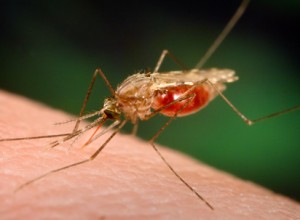Strong systems, more investments needed to deal with malaria and new outbreaks like COVID-19
 Against the backdrop of the COVID-19 pandemic, the 2020 World Malaria Day, which is just weeks away, is going to be commemorated with calls for greater investment in building and supporting resilient health systems to protect and advance progress against existing infectious diseases like malaria and to be prepared to effectively address new outbreaks like COVID-19.
Against the backdrop of the COVID-19 pandemic, the 2020 World Malaria Day, which is just weeks away, is going to be commemorated with calls for greater investment in building and supporting resilient health systems to protect and advance progress against existing infectious diseases like malaria and to be prepared to effectively address new outbreaks like COVID-19.
Malaria is increasingly a disease of poverty and inequity, with the most vulnerable at greatest risk of dying from a mosquito bite – particularly pregnant women and children under five in sub-Saharan Africa.
In 2018, nearly 900,000 children in 38 African countries were born with a low birth weight due to malaria in pregnancy, and children under five still accounted for two-thirds of all malaria deaths worldwide.
The organisation leading the largest global platform for coordinated action against malaria, the RBM Partnership to End Malaria, says it is important to put in more resources to deal with critical public health challenges like malaria and emerging ones such as the COVID-19, which has taken the world by storm with frantic efforts being made to curb the spread of the pandemic across the globe.
A statement made available to ghanabusinessnews.com, quotes Dr. Abdourahmane Diallo, CEO of RBM Partnership to End Malaria, as saying that as the “world grapples with the COVID-19 pandemic, we are reminded of the critical importance of strong health systems to fight deadly infectious diseases like malaria, which is still one of the leading causes of child mortality across Africa.”
“Progress against malaria can only be achieved with increased investment, and World Malaria Day is a crucial opportunity to remind global leaders of their commitments to end this preventable and treatable disease.”
He adds that “we must close the annual $2 billion gap in funding to reach all those at risk with the life-saving malaria tools they need, and boost research and development of new transformative tools to stop the cycle of extreme poverty.
“This will further strengthen existing efforts to address ongoing public health challenges like malaria and emerging ones like COVID-19,” he notes.
One month before World Malaria Day, the RBM Partnership to End Malaria underscores the need to maintain malaria elimination efforts throughout the COVID-19 pandemic.
This year’s World Malaria Day will highlight the importance of robust health and surveillance systems and sustaining malaria prevention and control interventions as the world grapples with COVID-19, helping ensure millions of the most vulnerable are protected from malaria, the statement notes.
The global awareness day will also emphasize the importance of upholding progress and commitments made in the global fight to end malaria.
World Malaria Day is observed on April 25 every year to raise awareness of the global burden of malaria, a preventable and treatable disease that puts half the world at risk and kills a child every two minutes.
World Malaria Day educates citizens in malaria affected countries on simple actions they can take to prevent malaria, highlights the impact of investments in ending malaria, and engages community, national and global leaders to ensure ending malaria remains a priority on the global agenda.
The global theme for Day, ‘Zero Malaria Starts with Me’, emphasizes everyone’s power and responsibility – no matter where they live – to ensure no one dies from a mosquito bite.
The statement indicates that, already, 14 countries have launched national ‘Zero Malaria Starts with Me’ campaigns, and several others are planning to do so this year, in support of this growing movement.
World Malaria Day 2020 will highlight, recognize and revitalize the involvement of high-burden countries in Africa, which account for approximately 70 per cent of the global malaria burden. Messages will engage political decision-makers, the private sector, civil society, the academic community and the public to take ownership of global malaria control and elimination efforts.
It will also shine a spotlight on the successes achieved in reducing the malaria burden around the world, including countries like India and those in the Greater Mekong Sub-region that made significant progress in recent years, as well as on countries recently certified malaria-free or that are on track to reach the 2020 elimination milestone set out in the global malaria strategy.
By Eunice Menka
Copyright ©2020 by Creative Imaginations Publicity
All rights reserved. This article or any portion thereof may not be reproduced or used in any manner whatsoever without the express written permission of the publisher except for the use of brief quotations in reviews.
